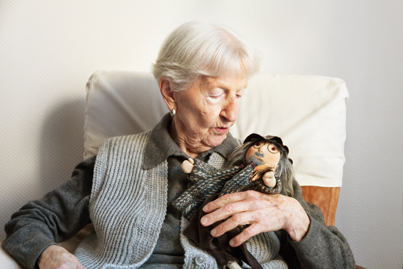Doll Therapy for Seniors with Alzheimer’s

Doll Therapy: One way to help ease the distress of Alzheimer’s
Alzheimer’s disease affects many senior citizens and can be hard for both the patient and their caregiver to deal with, especially as the disease progresses. Researchers have found a new type of therapy called doll therapy that can be very beneficial for Alzheimer’s and dementia patients to engage in. It’s one way Alzheimer’s disease caregivers can try to ease anxiety and bring joy to loved ones with dementia. Many caregivers have found doll therapy to be a good way to engage loved ones while giving them a purposeful and rewarding activity.
What is doll therapy?
Doll therapy involves providing a lifelike doll to a person with Alzheimer’s disease so that they can take care of it and play with it. As Alzheimer’s disease progresses, many of those with the disease begin to lose interest in things around them and begin to withdraw from daily activities. When provided with a doll to take care of, many Alzheimer’s patients take to the doll because their nurturing instincts kick in and motivate them to play with the doll which helps keep the Alzheimer’s patient from being withdrawn from their surroundings. Doll therapy is usually more effective in women, as women are generally considered to be more nurturing than men, but it can also be effective in men as well and should not be ruled out for male patients.
Benefits of doll therapy?
According to a Nursing Ethics article, providing a doll to someone with dementia has been associated with a number of benefits which include a reduction in episodes of distress, an increase in general well-being, improved dietary intake and higher levels of engagement with others. It could be argued that doll therapy facilitates the promotion of well-being and respect for autonomy (the person with dementia can exercise their right to engage with dolls if they wish).
5 tips for using doll therapy
Doll therapy can be beneficial. Here are a few tips to help:
- Do not call the doll a doll.
- Provide a bassinet or small crib for the doll.
- Do not purchase a doll that cries out loud, as that could be upsetting.
- Do not force a doll on any senior. Allow them to be stimulated, approach and hold the doll on their own time.
- Communicate the purpose of the doll for anyone else who may be providing care.
While some may feel that doll therapy isn’t dignified for an adult, and others may be troubled by seeing their parent playing with a doll, it can be a beneficial therapy and can help caregivers connect with their senior loved one. For example, family caregivers looking for activities for their loved one can try purchasing baby doll clothes for their loved one to put on the doll. Family caregivers can even consider buying a stroller for the doll so that their loved one can push it around the house and get some exercise while playing with their doll.
If you’re a caregiver for a senior who’s suffering from Alzheimer’s disease, there are a great number of senior living options and services available to help, including senior residences with Alzheimer’s specialty services. Visit Alternatives for Seniors for details.
Alternatives for Seniors is a print and online directory that specifically caters to the housing and personal care concerns of senior citizens and their families. Call our Senior Specialists at (888) WE-ASSIST (888-932-7747) or visit the Alternatives for Seniors website to begin searching for the perfect home for you or your loved ones. Also, be sure to join our Facebook community and follow us on Twitter.
BLOG Date: Thursday, April 9, 2015
Writer: Ryan Allen